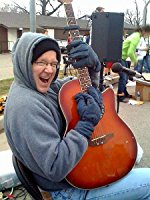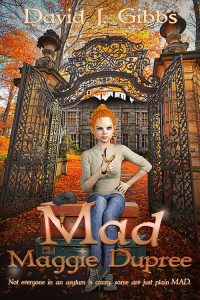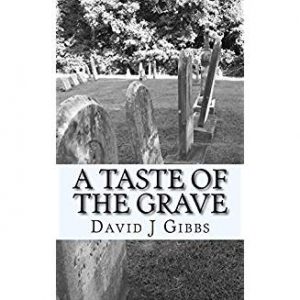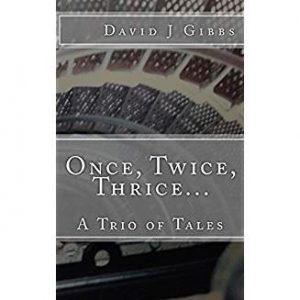 I met David through Storyteller Magazine, for which he was Editor and I was a mere peon volunteer curator, both of us contributors of short stories. David’s tales live in the darkness—we won’t ask where David lives (his website says Cincinnati; seems dubious)…..
I met David through Storyteller Magazine, for which he was Editor and I was a mere peon volunteer curator, both of us contributors of short stories. David’s tales live in the darkness—we won’t ask where David lives (his website says Cincinnati; seems dubious)…..

but his writing snatches you and drags you, wide-eyed and speechless, into the stories.
He, however, is a super friendly guy, so I wasn’t nervous about asking him for an interview. Links to connect with David come after the interview; check out his uber-user-friendly, gorgeous website, where anthology after anthology showcase David’s talent. The first book of his YA series “Mad Maggie Dupree” comes out June 26!
Tell me about your writing process, including schedule, environment, and inspirations. I love your blog post about the muse being a romantic notion. If you would, explain as well how you transitioned from this magical mythology to your prosaic philosophy of writing.
Well, as with most writers, my process has evolved over time. I used to like plotting and outlining everything before I even began writing my first word. When I’d get stuck plotting or writing, I’d blame my muse, the fickle little minx that she was. I honestly just thought that’s the way the writing process went. I’d have to wait for this mystical thing to whisper the next line or the key point I’d missed in my work.
That all changed a few years ago. I read about “pantsers” or those writers who didn’t plan anything and just wrote from the hip, so to speak. Honestly, I thought it was ridiculous. How could anyone write without planning, without plotting, without doing the leg work first?
Curious, I decided to give it a try and haven’t looked back. My output increased ten-fold and I enjoyed being surprised by the twists and turns the characters gave me. It’s made the process much more fulfilling.
Thought it may sound daunting to writers who are plotters and planners, I fully understand it. The thing is, now that I’m a “pantser” I don’t need a muse. I write. Period. I don’t have to wait for her to whisper to me. I trust myself as a storyteller and know I will come up with what needs to happen next as I’m writing the story. I no longer have writer’s block, because I merely write myself out of it. It helps me average over 2,000 words a day. Last year alone, I had my biggest output as a writer, finishing with 690,000 thousand words. That equated to eight novels and a dozen short stories.
Writers have to find what works for them, but they also need to be willing to try new things. Whether it’s a new spot in the house, writing at a coffee shop, or changing from pen and paper to a laptop or vice versa. Sometimes just making a small change can spark the most wonderful things.
Remember, writing is a superpower. Take a chance. Write some words. Make some magic.



My husband theorizes that people who suffered challenging childhoods prefer reading / writing horror. It happens to be true in my case. Although writing my debut novel was highly cathartic in healing some of that damage, I still love horror, so perhaps his theory is debatable. What draws you to the darkness?

I’m honestly not sure what’s drawn me to it. I’ve written in many different styles and different genres, but there’s always a touch of creepiness to everything I write.

While growing up, I enjoyed reading everything and anything I could my hands on. When we went to the library, in school, I always checked out books on UFO’s, Bigfoot, Loch Ness, Area 51, vampires, and werewolves. But when I read The Shining in middle school it was over. Horror hooked me.
Talk up your support system, from beta readers to reviewers, anyone and everyone who is your cheerleader, online and IRL.
 My family and friends have been incredibly supportive of my writing. But I have to say one of the most rewarding parts of being a writer and an editor is the community of friends and colleagues I’ve met along the way. I talk daily with my writing group, made up of fellow writers from the ashes of Storyteller Magazine. I also talk with quite a few writers on Twitter as well. It’s always great to share experiences with other writers and editors.
My family and friends have been incredibly supportive of my writing. But I have to say one of the most rewarding parts of being a writer and an editor is the community of friends and colleagues I’ve met along the way. I talk daily with my writing group, made up of fellow writers from the ashes of Storyteller Magazine. I also talk with quite a few writers on Twitter as well. It’s always great to share experiences with other writers and editors.
Describe your publishing process from final draft to final product, from perspectives of self-publishing, and all that entails, and traditional publishing, including your publishing team.
I’ve enjoyed both self-publishing and traditional publishing. They have both been fulfilling and challenging at the same time. Both require a lot of work, but in the end the onus is definitely on the author to make them both as successful as possible.
I’ve found a wonderful home with Clean Reads Publishing, formerly Astraea Publishing. The owner, Stephanie Griffith, has been great. She has an impressive group of editors she works with who are thoughtful and thorough working through both Mad Maggie Dupree manuscripts they’ve accepted. This is my first foray into the middle grade arena and it’s been an awesome experience so far. They have their own art department which has done outstanding work bringing Mad Maggie Dupree to life.



What do you love most about your creativity?
That I can use it to escape at moment’s notice. No matter how good or how bad the day, writing is the gravy that makes it all worthwhile.



Author Extra: Write a flash fiction piece right now! 50 words, mister!
He heard the sound again, sharp and flinty, a bone poking his heart. He stared into the darkness, waiting for the knobby knuckled hand to clutch at his clothes, the chill bone deep. Then grandma appeared, withered and stooped, giving him a goodnight kiss, hands icy, breath from a crypt.




Connect with David: